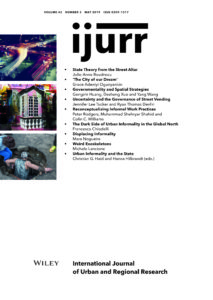The article explores the politics of life underground in Bucharest, Romania. It focuses on a tunnel passing under Bucharest’s central train station, where a community of drug users and so‐called ‘homeless’ have made a long‐standing home, using a space that many others considered uninhabitable. Relying on extensive ethnographic observations and interviews undertaken within the tunnels, the article traces and illustrates the socio‐material entanglements characterizing life underground. It frames this assemblage of bodies, veins, syringes, substances and various relationships of power and affect, as a ‘propositional politics’ of home and life at the margins. Such a politics speaks of drug addiction and extreme marginalization, but also of a sense of belonging, reciprocal trust and care. In tracing such a politics, the article does not aim to romanticize the status of home in the underground or to treat it as the marginal antithesis of normative homeliness, but to reveal the ways in which an affirmative, self‐grounding politics of home emerges from the immanence of tunnel life within the fabric of the city. As such, the article contributes to debates around homing practices in conditions of uninhabitability and proposes a radical approach to the politics of life at the margins in the contemporary urban.

